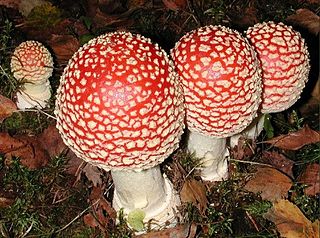
A mycorrhiza is a symbiotic association between a fungus and a plant. The term mycorrhiza refers to the role of the fungus in the plant's rhizosphere, its root system. Mycorrhizae play important roles in plant nutrition, soil biology, and soil chemistry.

In biological classification, a subfamily is an auxiliary (intermediate) taxonomic rank, next below family but more inclusive than genus. Standard nomenclature rules end botanical subfamily names with "-oideae", and zoological subfamily names with "-inae".

The Boletales are an order of Agaricomycetes containing over 1300 species with a diverse array of fruiting body types. The boletes are the best known members of this group, and until recently, the Boletales were thought to only contain boletes. The Boletales are now known to contain distinct groups of agarics, puffballs, and other fruiting-body types.
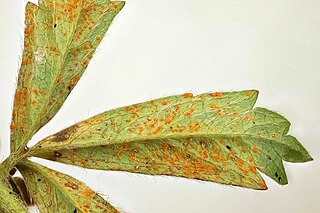
Frommeella tormentillae is a species of rust fungus in the family Phragmidiaceae. It is a plant pathogen affecting the strawberry.

A fungus is any member of the group of eukaryotic organisms that includes microorganisms such as yeasts and molds, as well as the more familiar mushrooms. These organisms are classified as one of the traditional eukaryotic kingdoms, along with Animalia, Plantae and either Protista or Protozoa and Chromista.
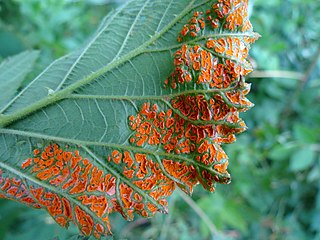
Arthuriomyces is a genus of rust fungi in the family Phragmidiaceae. The genus contains three species that are found in North America, Russia, China, and Japan. The genus is named in honor of American botanist Joseph Charles Arthur, noted for his research on rust fungi.
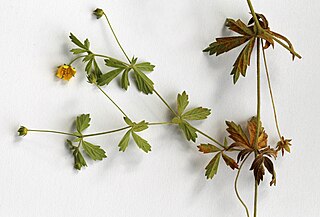
Frommeella (Frommeëlla) is a genus of rust fungi in the family Phragmidiaceae. The widespread genus contains two species.
Gerwasia is a genus of rust fungi in the family Phragmidiaceae. Species in the genus grow on Rubus and Rosa plants.

Gymnoconia is a genus of rust fungi in the family Phragmidiaceae. G. nitens causes an orange rust of Rubus species.
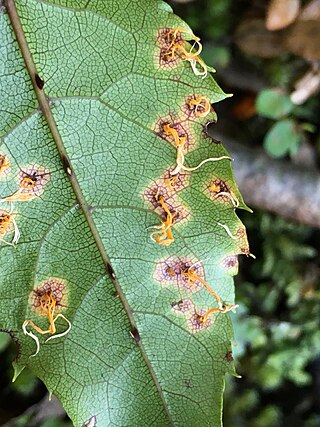
Hamaspora is a genus of rust fungi in the family Phragmidiaceae. The genus contains 14 species, which are known from Africa, Asia, and Australia.
Joerstadia is a genus of rust fungi in the family Phragmidiaceae. The genus contains four species known from Africa, including Madagascar, which grow on Alchemilla plants.
Kuehneola is a genus of rust fungi in the family Phragmidiaceae. The widespread genus contains nine species.
The Morispora is a genus of rust fungi in the family Phragmidiaceae. The genus is monotypic, containing the single South American species Morispora tenella.
Scutelliformis is a genus of rust fungi in the family Phragmidiaceae. The genus is monotypic, containing the single species Scutelliformis bicornus.
Trachyspora is a genus of rust fungi in the family Phragmidiaceae. The genus, widespread in northern temperate areas, contains six species.

Chrysomyxa is a genus of rust fungi in the family Coleosporiaceae. The genus, widespread in the Northern Hemisphere, contains about 23 species. Rust fungi in the genus Chrysomyxa occur in boreal forests of the northern hemisphere on Pinaceae,, and most species alternate to angiosperm hosts in the Ericaceae.










